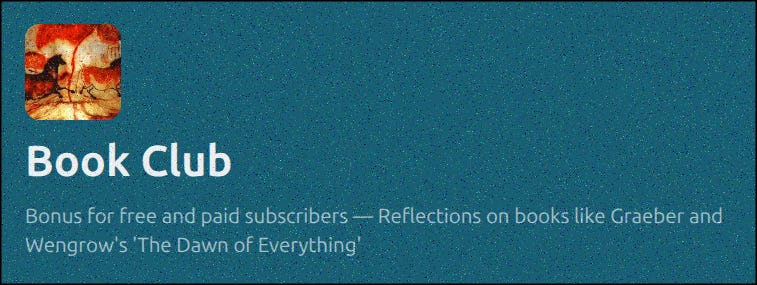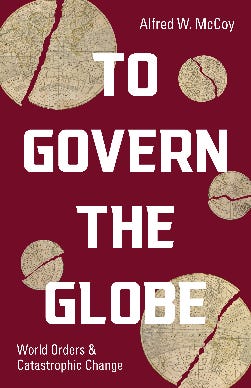The long march down, then large, magnificent, then — here the miracle occurs — the fire put out in one dark hellish Krellish punishing night. Thus the universe folds back on itself and lifts its glass: To mankind, coming and gone.
The world has gone crazy; perhaps you’ve noticed that.
One of the least important things this whirlwind has caused is to throw me off schedule for the Book Club feature at this site. That feature started with reflections on David Graeber and David Wengrow’s book The Dawn of Everything and went on to include works like Kim Stanley Robinson’s The Ministry for the Future and Alfred McCoy’s To Govern the Globe: World Orders and Catastrophic Change.
The Book Club menu is here.
The Book Club has grown to include many topics. A few of the pieces are offered just for fun, like the way Gore Vidal’s critique of FDR’s entry into World War II is repeated in Anthony Horowitz’s James Bond pastiche Forever and a Day. (You may know Horowitz as the creator of the TV series Foyle’s War and Magpie Murders.)
The Tale of Our Species from Start to Near Its End
But the works we’ve covered in some depth have a single focus: In the whole of human history — which spans either 200,000 years if you include just Homo sapiens (us), or two million years if you also count Homo erectus, maker of tools, user of fire, and mother of all modern humans — in all that time, we’ve spent most of our lives in tribes. We call that long period the Old Stone Age. That life is what we call home. Counting just us (Homo sapiens), non-sedentary life — life moving around — covers 92% of our time on earth.
Then some of us, not very many, began switching to mixed or sedentary lives. Of those, some adopted a kind of proto-agriculture (taking advantage of naturally occurring fields), then fixed-field agriculture (think weeding and plows). After another long stretch, again lasting thousands of years, we evolved (devolved?) to states and empires, and with it the joys and pains of life with rulers. None of this happened quickly. Thousands of years passed between stages, each occurred regionally at different times, and some stages never happened at all in certain locations.
This is the time of interest, what I want to study, this long transition from full hunter-gatherer life to rulers and ruled — to life with states and kings.
Why do this?
For one thing, you could argue that hierarchical life is killing us all. Our current rulers, the less than a thousand people whose actions have force, will murder the rest of us, not sparing themselves, in less than a century or so. Those who escape will enter … you guessed it … the Old Stone Age, again. A perfect arc.
Another reason is the question of inevitability: Did we really have to end up living this way? If not, what happened to force it? And how do we get out?
Coming Attractions
So that’s what’s been interrupted here at God’s Spies, a closer examination of our species’ great path. What’s coming? I’m going to make looking at this a priority.
In particular, I’m going to complete our look at the destructive march of the West in Alfred McCoy’s To Govern the Globe. It still has much to teach us.
Then we’ll look at two works interspersed: David Graeber and David Wengrow’s The Dawn of Everything, which we’ve already started (see here), and a new work that touches on the same topic and time, James C. Scott’s Against the Grain: A Deep History of the Earliest States.
Each asks the same questions: How did we get stuck, almost eight billion of us, living with rulers and states? Is this mode of life an advance, a regression, or neither? Are there other paths a society could have taken? If so, why did we take this one?
The answers won’t come in a series of essays — that would involve writing a book — but a series of observations that, I hope, will be easily digested and stimulate thought.
A Taste: ‘Western’ Notions of Liberty Came from Aboriginal Americans
One such observation from these works is this: Did you know that the Enlightenment critique of European life, with its kings, nobles, much-abused citizens and slaves — a critique that produced our modern notions of “freedom” — came not from Enlightenment thinkers, but from aboriginal Americans who encountered the West, saw it for what it was and criticized it brilliantly?
The idea that our current ideals of freedom, equality and democracy are somehow products of the ‘Western tradition’ would in fact have come as an enormous surprise to someone like Voltaire. As we’ll soon see, the Enlightenment thinkers who propounded such ideals almost invariably put them in the mouths of foreigners, even ‘savages’ like the Yanomami. This is hardly surprising, since it’s almost impossible to find a single author in that Western tradition, from Plato to Marcus Aurelius to Erasmus, who did not make it clear that they would have been opposed to such ideas. The word ‘democracy’ might have been invented in Europe (barely, since Greece at the time was much closer culturally to North Africa and the Middle East than it was to, say, England), but it’s almost impossible to find a single European author before the nineteenth century who suggested it [democracy] would be anything other than a terrible form of government.
—from Chapter 1, The Dawn of Everything
More to follow in future Book Club pieces.
Free and Paid Subscriptions
A note: Some pieces will be free, and some will have sections marked paid. As originally intended, I want to give something back to the generous folks who can afford to help by paying for what we do.
Free subscribers need not fear — regular posts will continue as before, generally once a week. In addition, all paid pieces will have significant opening parts that are free to all. We value each of you; our goal is to spread information, not put fences around it.
I hope you’ll find these changes helpful and enlightening. Feel free to give your thoughts on this in the comments.








